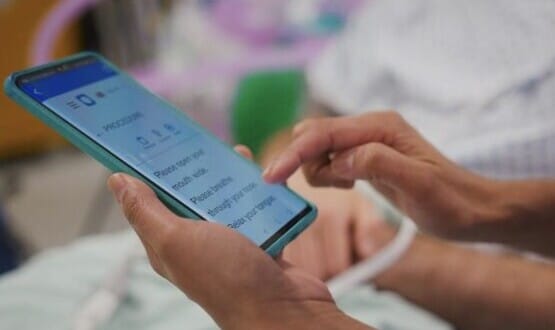Digital Health Rewired Pitchfest 2022 winner profile: CardMedic
- 27 April 2022

After another competitive Pitchfest competition, CardMedic were crowned champions for 2022 following the live final at Rewired, the latest jewel in an already impressive crown.
It was the first in-person final since 2020, with Peppy Health winning Pitchfest 2021 in what was an entirely online process amidst the Covid-19 pandemic.
Flying the flag for CardMedic all the way through to this year’s final was Dr Rachael Grimaldi, co-founder and CEO of the company.
She took part in the online heats and presented in the live final on day two of Rewired 2022, ultimately picking up the trophy and the prize of having the opportunity to test and scale CardMedic’s solution at Chelsea and Westminster Hospital NHS Foundation Trust.
Grimaldi delves deeper into the start-up company that took the Pitchfest crown and the impressive journey she has been on that lead to the triumph.
What does CardMedic do?
CardMedic provides digital flashcards in multiple languages to guide people with additional communication needs through clinical interactions. These communication needs could be a result of deafness, blindness, language barriers or because of wearing PPE.
As a result, we are helping to make healthcare accessible to more people, empowering patients to be involved in clinical decision making, and reducing health inequalities.
Many of these patients wouldn’t be able to communicate with their clinician otherwise, leaving them confused, anxious, and in some cases, terrified as they do not understand what is happening to them.
What gave you the idea for CardMedic?
When on maternity leave, I read an article about someone who could not understand their clinician through PPE, leaving them terrified of what was going to happen to them when going in for an operation.
This made me realise that there have always been communication barriers for people needing to access healthcare and was only being exacerbated by the wearing of PPE.
With communication being at the heart of healthcare, and poor communication being a major blocker to accessing equitable healthcare, I developed CardMedic.
How will CardMedic change the way the NHS works?
CardMedic will reduce health inequalities, improve patient safety, promote patient empowerment, and improve clinical practices. Sometimes clinicians have no option but to call on patients’ friends and family members to help them communicate so they can understand what is happening.
By introducing CardMedic, clinicians are no longer forced to partake in this unethical practice and are able to communicate with their patients in a dignified and ethical way which enables the patient to play an active role in decision making.
What gap in the market does CardMedic address?
35% of people have additional communication needs, and until CardMedic was created, there was no way of enabling clinicians to communicate with these patients in a respectful and sustainable way.
For the first time, people are able to understand their clinical teams and what is going on with their care, as well as make decisions about it in partnership with their clinician.
How have you got to where you are now?
We were able to build connections through the NHS Clinical Entrepreneur Programme, through our work with the KSS AHSN, and by committing an awful lot of time and energy to making CardMedic what it needed to be for staff on the front line.
As a clinician myself, I knew what we were creating needed to be addressing a very specific problem and that it was exactly what clinicians needed. Staying true to that has been a very key ingredient to our success.
Why did you decide to enter the health tech start-up space?
We needed to! It is unacceptable and unsafe that there are people trying to access health and care services but are restricted by their communication needs. Everyone should be able to access the same standard of healthcare, irrespective of who they are.
Have you faced many barriers in getting CardMedic off the ground?
Starting a business is always going to be a challenge, but we identified there was a need for what we had created. All interest in CardMedic has come from inbound leads, not one connection has been a result of cold calling.
Why did you decide to enter Pitchfest?
It’s one of the most well renowned start-up competitions in the health tech space. It would have been foolish to have not got involved.
How did you find the experience?
It was a brilliant experience to build our confidence with pitching – standing on stage and given three minutes to pitch CardMedic in front of an incredibly impressive panel of judges is the definition of nerve wracking.
Looking to the future, what do you hope CardMedic will achieve and what’s the next step in achieving that goal?
CardMedic is already available in 19 languages and is being used by 50,000 people in 120 countries. We are aiming for 30 languages to be available soon. We’re currently piloting at University Hospitals Sussex and the Royal Marsden and are excited to introduce CardMedic to Chelsea and Westminster under the CW+ Innovation Programme off the back of the Pitchfest win.
We’re excited to show how CardMedic can be scaled trust wide and make a substantial, organised tackle against health inequalities.
What advice do you have for others looking to enter the health tech start-up scene?
Just start! The solution you create needs to be just that – a solution to a real problem. There’s no point going in and blindly creating something you think will be helpful for clinicians. You need to understand their struggles and needs to create something that actually solves these problems.
For a much more in-depth discussion of CardMedic’s background, experience of Pitchfest 2022 and exciting plans for the future, listen back to our latest episode of Digital Health Unplugged, where host Jordan Sollof sat down with Dr Rachael Grimaldi.
You can listen to ‘Digital Health Unplugged: CardMedic win Pitchfest 2022’ here.




